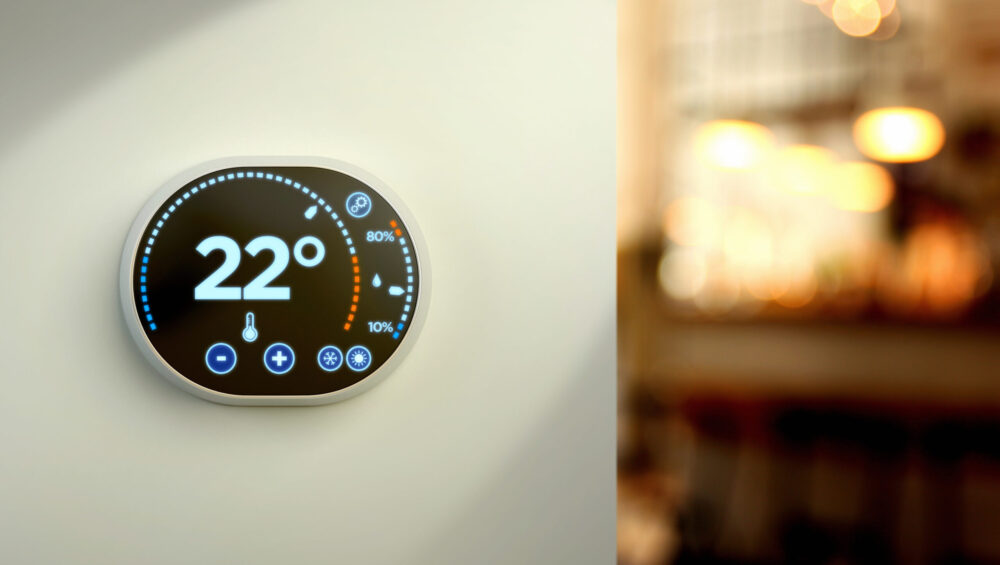Remember when smart home devices were whiz-bang novelties destined for residences of the future?
News flash: the future is now.
According to one recent article, “The growing consumer propensity toward the adoption and usage of connected devices is augmenting the demand … KB Home, a home builder company in the United States, released data indicating a 44% increase in smart appliance selection by its clients.” [1]
But smart technology is only half the story. With calls worldwide for net-zero greenhouse gas emissions by 2050, there is increasing demand for smart homes that are sustainable, as well. After all, a significant percentage of emissions come from homes. If we are to reach targets to limit the planet’s warming to 1.5ºC by 2050, homes must play an instrumental role.
A global consumer survey conducted for Schneider Electric shows that 75% of those surveyed are concerned about climate change, with more than half (55%) believing it’s important that their homes become net zero.2
That’s significant because when it comes to energy consumption, homes are where people can have the greatest impact, especially with residential electricity consumption expected to double by 2050. And when a smart house incorporates solar, wind, geothermal, and energy storage, it becomes a sustainable house as well.3
Why homebuilders should invest in smart and sustainable home solutions
Smart controls make homes more resilient, efficient, and personalized. They boost comfort, safety, and convenience for occupants while lowering a residence’s environmental footprint. That’s reason enough for builders to incorporate smart solutions into their home construction and renovation plans. But there are other incentives, as well.
Smart technology increases real estate values and differentiates properties in today’s highly competitive homebuying marketplace. And smart devices and IoT technology, once considered a luxury, are now commonplace. Consumers expect homes to be equipped with them, whether a property is newly built or renovated.
According to Statista, smart home revenues have been on the rise. Smart home sales in the United States are projected to reach almost 47 billion U.S. dollars by 2025, which would be approximately twice the amount of revenue in 2020.4 And an independent study conducted by John Burns Real Estate Consulting found more than 60% of new-home shoppers said they were willing to pay more for smart features.5
Solutions that advance sustainability are equally attractive to homebuyers. Such solutions ensure properties comply with environmental regulations while meeting customer demands for homes that reflect their values as good environmental stewards. Schneider Electric’s global consumer survey shows that 7 out of 10 consumers think it is important to lead a sustainable lifestyle.6
For homebuilders, smart technology and sustainability solutions are smart business investments. If homeowners see that modern functionalities are already built into a home, they become “less price-sensitive and more excited by the new possibilities.”7 For a small upfront investment, builders can exponentially increase their ROI.8
So what’s driving the smart home market today?
Overall, the widespread adoption of home technology, thanks mostly to companies such as Amazon, Apple, and Google, has made connectivity an affordable and expected standard in new-home construction.9 So we are witnessing the mainstreaming of smart home features such as Wi-Fi-enabled video doorbells, light switches, thermostats, smart door locks, advanced garage door openers, and weather-sensing irrigation systems.10
Top smart home trends today include:
- Integration of multiple devices on a single smart home platform, including the open-source interoperability standard known as Matter, which enables different devices and ecosystems to interact seamlessly11
- Adoption of touchless technology in doorbells, light switches, faucets, and more to accommodate behaviors in a COVID-changed world
- Upgrades to “health tech” solutions, including smart air purifiers and stand-alone humidity sensors
- Smart home security systems that incorporate sensors, control panels, door and window sensors, floodlights, doorbells, and cameras, and allow remote monitoring and control from anywhere
- Home office enhancements, including mesh Wi-Fi, noise-cancelling windows, and AI filters for video conferencing backgrounds12
A Wiser approach
A comprehensive smart home solution
|
|
|
|
Wiser by Schneider Electric is a complete smart home solution that lets builders meet the needs of customers in new homes and renovations. It integrates all essential smart home controls, including lighting, shutters, heating and cooling, electrical appliances, home access, and security management.
And with Wiser, builders can easily scale smart home systems to match customer preferences and project budgets, introducing Wiser as a standard solution in the design phase or presenting it as an upgrade option in the sales phase.
A custom poll conducted by Branded Research for BUILDER magazine asked builders to identify the most powerful value propositions for including smart amenities in new homes. Among the top benefits cited were convenience, eco-friendliness, and safety.
Builders also mentioned increased home values and differentiation from older housing stock as attributes that buyers find valuable.13
Wiser solutions deliver sustainability benefits in numerous ways, including lowering energy bills and carbon footprints by:
- Switching off devices that are not being used
- Creating “Away” moments to automatically switch off appliances when nobody is at home
- Turning off lights, air conditioning, and appliances when nobody is detected in the room
- Turning off air conditioning when an open window is detected in the room
- Managing lights and shutters automatically, according to the sunrise and sunset

In addition to increasing the perceived value of properties, smart and sustainable home solutions deliver high-level profit gains for builders. With the average investment in smart homes at €20-35/m2, Schneider Electric partners report that the additional selling price is up to €50/m2. Smart home costs can be easily included in the property mortgage with the total price of development.
Comprehensive Schneider Electric support adds value for homebuilders throughout the design-build process, as well. As partners, they have access to Schneider Electric training sessions, prescription guides, libraries for prescription, software, and technical and commercial support.
A certified partner network, including Wiser-approved installers’, is available throughout the construction phase. During the sales process, support includes promotion tools, upselling support, and marketing and communication materials. And after the closing, a Wiser welcome kit gives homeowners everything their need to start using smart functions and get connected with Schneider Electric.
Learn more about building sustainable homes of the future with Wiser.
References:
- https://indiandefencenews.info/159585/uncategorized/smart-home-appliances-market-is-projected-to-experience-promising-growth-opportunities-in-the-forecast-period-2021-2031/
- The representative consumer survey was conducted by Opinium on behalf of Schneider Electric amongst 8,019 respondents across 6 markets (Australia, France, Spain, Sweden, UK and USA) in July 2021. All surveys were conducted in respondents’ native language, with translations provided by a professional translation company.
- https://www.forbes.com/sites/johnkoetsier/2021/11/23/smart-from-the-start-smart-home-is-becoming-sustainable-home/?sh=67db98e6c55e
- https://www.statista.com/topics/6201/smart-home-in-the-united-states/#dossierKeyfigures
- https://www.builderonline.com/design/technology/for-many-builders-smart-homes-now-come-standard_o
- The representative consumer survey was conducted by Opinium on behalf of Schneider Electric amongst 8,019 respondents across 6 markets (Australia, France, Spain, Sweden, UK and USA) in July 2021. All surveys were conducted in respondents’ native language, with translations provided by a professional translation company.
- http://www.pert.me/why-builders-construction-businesses-in-india-are-turning-towards-smart-homes/
- http://www.pert.me/why-builders-construction-businesses-in-india-are-turning-towards-smart-homes/
- https://www.builderonline.com/design/technology/for-many-builders-smart-homes-now-come-standard_o
- https://www.builderonline.com/design/technology/for-many-builders-smart-homes-now-come-standard_o
- https://www.wired.com/story/what-is-matter/
- https://www.forbes.com/advisor/home-improvement/smart-home-tech-trends/
- https://www.builderonline.com/design/technology/for-many-builders-smart-homes-now-come-standard_o




